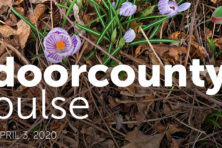Loneliness and Isolation
- Share
- Tweet
- Pin
- Share
by Anni Lampert, Domestic Violence Advocate, HELP of Door County
Everybody feels lonely once in a while. For those of us lucky enough to have family, friends, neighbors and co-workers we interact with often, we are likely to connect with someone in our network and snap out of it. Not everyone is so fortunate.
We humans are highly social beasts hardwired to connect with each other. When circumstances conspire to break those connections we do not thrive.
The longer loneliness persists, the harder it gets for us to see its effects on ourselves. Some of the most common ways loneliness can present itself is by us pulling away from people with whom we usually spend time, or by not engaging in activities we enjoy, or not taking care of our health or appearance. We may feel bored or stuck. Our self-esteem takes a hit and our confidence is diminished.
These symptoms can lead to social anxiety and depression. There is also a clear connection between lowered self-confidence and domestic abuse and sexual assault. Both domestic violence and sexual assault are perpetrated by one person exerting power and control over another. It’s easier to do that with someone who is already weakened by loneliness.
Jamie Craig, Door County program coordinator for the Sexual Assault Center, explains how her organization responds to loneliness and isolation. She said, “We offer trained advocates on our 24/7 hotline. People use the hotline to speak about issues or difficulties they might be experiencing, ask questions about our services and some call to share their struggles and successes. They might not discuss sexual assault but talking to another person can help them feel better when they are feeling lonely or isolated.”
Milly Gonzales, HELP of Door County’s domestic violence program coordinator, put it this way: “HELP’s advocates meet clients where they are, whether that’s here in the office or out in the community. We work hard at being that safe place where they are believed, supported and strengthened so they can explore their options for a healthier life and make their plan come true. We have often been told by our clients that because we listened to them – really listened – that they know they are not alone and that makes them feel better and stronger.”
Both organizations meet with clients one-on-one and connect them to resources provided by many other county organizations including, but certainly not limited to, the Door County Department of Human Services, the Door County Housing Authority, Feed & Clothe My People, Loaves & Fishes, Cradle to Career, Lakeshore CAP’s food pantry, the Salvation Army, NWTC’s Invest Dream Achieve program, Money Management Counselors at FISC, and many, many others.
What can you do? The holidays give us all lots of easy ways to reach out to each other. Check in with a neighbor you haven’t seen around much lately. Invite a shy colleague out for a fancy coffee drink. Call that family member who didn’t make it to Thanksgiving dinner and get together.
This article is brought to you in part by the Door County Coordinated Community Response (CCR) to Domestic Violence and Sexual Assault Teams and the Door County Elder and Adult-at-Risk Interdisciplinary Team.


